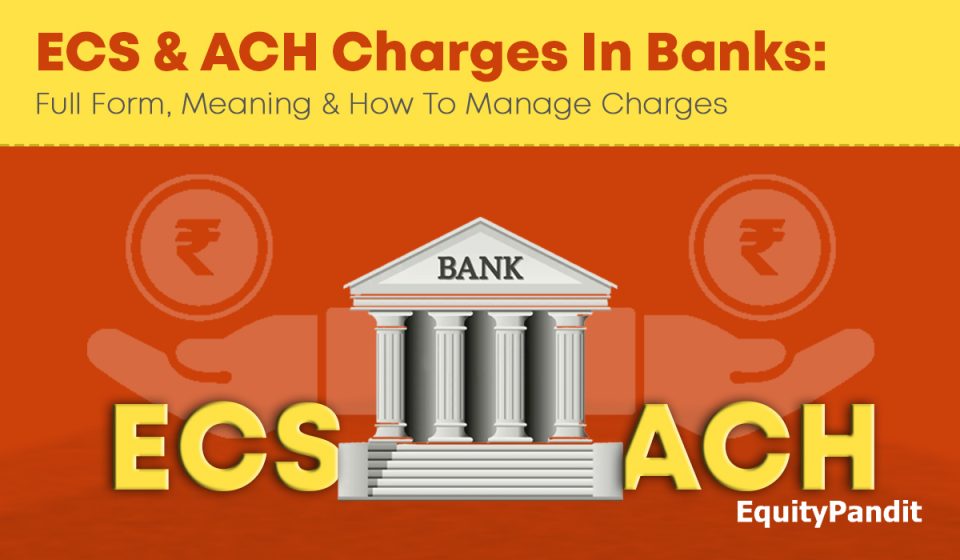Managing your finances effectively starts with understanding the various charges your bank imposes. Among these, ECS and ACH charges often leave many confused. These charges are tied to automated payments and fund transfers, which are widely used for convenience in today’s banking system. By understanding what ECS and ACH mean and how they impact your transactions, you can make smarter financial decisions and even find ways to minimise unnecessary fees.
Understanding ACH (Automated Clearing House)
ACH stands for Automated Clearing House.
The Automated Clearing House (ACH) is a system for transferring funds electronically, managed by the National Automated Clearinghouse Association (Nacha). It plays a key role in processing large volumes of credit and debit transactions, making it a versatile option for digital payments. Because of its efficiency, many banks, brokerages, and private businesses offer ACH services to their customers. This system enables customers to receive direct deposits and make bill payments quickly and conveniently.
The Automated Clearing House (ACH) originated in the late 1960s and became official in the mid-1970s. It supports various transactions like payroll deposits, one-time debits, social security payments, and tax refunds by transferring credits or debits between accounts. While ACH is the U.S. version, as of October 2023, similar systems with slight differences are used for payments in 40% of countries worldwide.
How ACH Works?
An ACH transaction starts when an originator initiates a direct deposit or payment, which can be a debit or credit. The originator’s bank, called the Originating Depository Financial Institution (ODFI), gathers multiple ACH requests into batches and sends them at scheduled times.
The batches are sent to an ACH operator, either the Federal Reserve or a clearinghouse, which processes the transactions. The operator sorts the batches and forwards them to the recipient’s bank, known as the Receiving Depository Financial Institution (RDFI). The recipient’s account is then debited or credited, completing the transaction.
Advantages of ACH:
- Settles transactions quickly, typically within 1-2 business days.
- Automates payments like direct deposits and e-checks.
- Offers same-day processing for faster transactions.
- Allows international transfers (IAT).
- Reduces errors and enhances transaction security.
Understanding ECS (Electronic Clearing System)
ECS stands for Electronic Clearing Service.
ECS, or Electronic Clearing System, is a banking service designed to simplify complex payment processes. With various payments like EMIs, loan repayments, and recurring deposits, managing them manually can be challenging. ECS helps automate these transactions, reducing paperwork and ensuring convenience.
It allows banks to deduct payments directly from your account with your consent. Customers need to fill out an ECS mandate form, which serves as proof and instruction for the bank to process payments. ECS is versatile and supports various financial transactions.
The primary goal of ECS is to ensure timely payments, helping avoid late fees and making repetitive payments hassle-free.
How ECS Works?
In banking, ECS allows you to set standing instructions for automatic payments. It works by debiting a specific amount from your account and crediting it to another. Setting up an ECS mandate involves these steps:
- Collect the ECS mandate form from your bank.
- Fill in details like account number, branch, account holder name, and the debit amount.
- Sign the form and submit it for verification. The bank sends it to NPCI (National Payments Corporation of India) for approval.
- Once verified, payments are debited as per the mandate.
You can set a maximum debit limit to control the amount deducted and cancel the mandate anytime through net or mobile banking.
Advantages of ECS:
- Reduces paperwork by automating payments.
- Increases efficiency with streamlined processes.
- Minimizes errors due to automation.
- Scheduled payments help avoid late fees.
- Saves time and money by reducing manual efforts.
Electronic Clearing Service Charges
ECS transaction charges depend on the type of transaction and the bank’s policies. It’s important to review your bank’s guidelines for clarity.
ECS Verification: Many banks offer free ECS verification services.
ECS Return Charges: A nominal fee is charged if an ECS transaction bounces due to insufficient funds. Charges vary by bank and account type.
How to Manage ECS and ACH Charges
Managing ECS and ACH charges requires understanding your banking habits and making informed choices. Start by opting for accounts that offer fee-free or low-cost transaction options, as many banks provide such services for specific account types. Comparing banks to identify those with lower or no charges for electronic transactions is also a smart approach.
Additionally, leveraging direct deposit or other digital payment methods can reduce costs, as these are often exempt from fees. It’s essential to be aware of transaction limits set by your bank, as exceeding these can lead to additional charges. Planning your transactions efficiently and staying informed about your bank’s fee structure will help minimize expenses associated with ECS and ACH.
Frequently Asked Questions (FAQs)
What is the difference between ECS and ACH?
ECS (Electronic Clearing Service) is used primarily in India for recurring payments like EMIs and utility bills, while ACH (Automated Clearing House) is a global system for electronic fund transfers, handling payroll deposits, bill payments, and tax refunds. ACH processes both debit and credit transactions more efficiently, often with international reach.
Can I avoid ECS and ACH charges?
Yes, you can minimise or avoid charges by choosing banks that offer fee-free accounts, staying within transaction limits, and using methods like direct deposits that may be exempt from fees. Reviewing your bank’s fee structure is key.
Are ECS and ACH transactions safe?
Both ECS and ACH systems are highly secure. They follow stringent regulations and encryption protocols to ensure the safety of financial transactions, minimising the risk of fraud or errors.
Unlock profitable opportunities every day! Unicorn Signals provides actionable intraday trading signals for stocks and futures. Don’t miss out – download Unicorn Signals and start winning now!
 Live
Live

